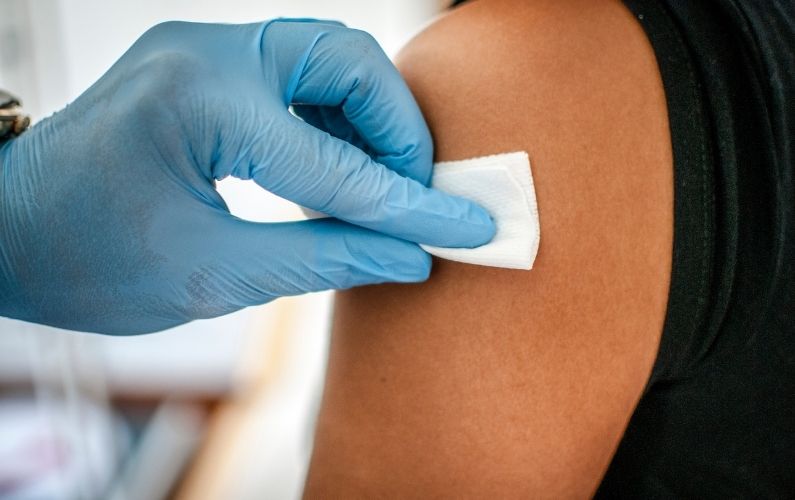What You Should Know About the Pneumonia Vaccine

Learn more about how the pneumonia vaccine can protect you and reduce your risk. Plus, see our top prevention and treatment tips!
Pneumonia is a respiratory infection that affects the lungs. More specifically, it causes inflammation in the lung’s air sacs, leading to breathing problems. It can also cause severe symptoms like fever, cough, and breathing difficulties. If not treated on time, pneumonia can lead to serious complications.
Thankfully, the pneumonia vaccine can help. Keep reading to learn everything you need to know about pneumonia and its vaccine.
What is Pneumonia and How Do You Get It?
Pneumonia is a respiratory infection caused by bacteria, viruses, or fungi. It usually occurs when you breathe the germs directly into your lungs. Depending on the specific cause, several types of pneumonia may occur:
- Hospital-acquired pneumonia is acquired while being treated at a hospital.
- Ventilator acquired pneumonia that occurs due to the use of a ventilator in a hospital.
- Aspiration pneumonia is caused by inhaling bacteria from drinks, saliva, or food.
- Community-acquired pneumonia is acquired in places other than hospitals and institutions.

What are the Symptoms of Pneumonia?
Pneumonia can cause one or more of the following symptoms:
- Cough that produces mucus
- Cough with blood in the mucus
- Fever
- Chills or sweating
- Shortness of breath that makes it difficult to do routine work
- Chest pain that increases while coughing or taking a deep breath
- Fatigue and weakness
- Headaches
- Nausea and loss of appetite
How do You Treat Pneumonia?
Healthcare professionals can treat pneumonia through medications. In most people, it clears up within 15 to 30 days. In some cases, the symptoms can aggravate, and the patient may require treatment at a hospital. People with weak immunity are more likely to face severe symptoms. Likewise, those with compromised immune systems may require treatment in an ICU (intensive care unit) with ventilator support or oxygen support for breathing.
The most common treatment for pneumonia is the use of antibiotics. In most cases, antibiotics can prevent complications. Patients may also require medicines for reducing fever and cough symptoms.
It is essential to compliment pneumonia treatment with rest and proper sleep. Drinking a lot of fluids is also recommended to prevent dehydration.

How to Prevent Pneumonia
The pneumonia vaccine offers protection against pneumonia, especially for those who have a higher risk. Apart from vaccination, some other tips that can prevent pneumonia are:
- Washing your hands regularly with soap and water to avoid getting infected by others.
- Covering your mouth and nose while coughing/sneezing and disposing of used tissues promptly.
- Following a healthy lifestyle with nutritious food, sufficient exercise, and proper sleep to improve the body’s natural immunity.
- Avoiding smoking as it can drastically increase the risk of pneumonia.
What You Should Know About the Pneumonia Vaccine
The pneumonia vaccines are prepared using the pneumococcus bacteria. The vaccine contains weakened bacteria that cannot cause any harm to the body. When the vaccine is injected, the immune system produces antibodies to destroy the pneumococcus bacteria. Once produced, these antibodies remain in the body for some time. If the actual pneumonia bacteria infects you, these antibodies can help your body fight the bacteria.
There are two types of vaccines – PCV (Pneumococcal conjugate) and PPV (Pneumococcal polysaccharide). PCV is for babies, children who didn’t get vaccinated earlier, and adults with certain risk factors. PPV is for the elderly and those who have health issues that increase their risk of getting pneumonia.
Pneumonia Vaccine Side Effects and Effectiveness
The vaccine is administered in the form of an injection. While relatively rare, pneumonia vaccine side effects include redness in the injected area, mild fever, muscle pain, and irritability. In most people, the vaccine is tolerated well and leads to the production of antibodies that can protect against bacterial pneumonia.
The vaccine is 97% effective in children who receive four doses of the vaccine. While older adults with weakened immunity can still get infected, the vaccine can help prevent serious complications.
Getting the Vaccine
If you have weakened immunity or health problems, speak with your healthcare professional about getting vaccinated.
We offer the pneumonia vaccine at all of our Wellness Pharmacy locations and can answer any questions you may have. If you would like to book an appointment, please contact us here.
Finally, we hope you found this post informative. Be sure to follow the prevention tips shared above and maintain a healthy lifestyle to reduce your risk.
Sources:
https://www.healthlinkbc.ca/health-topics/hw63868
https://www.webmd.com/lung/pneumococcal-vaccine-schedule


